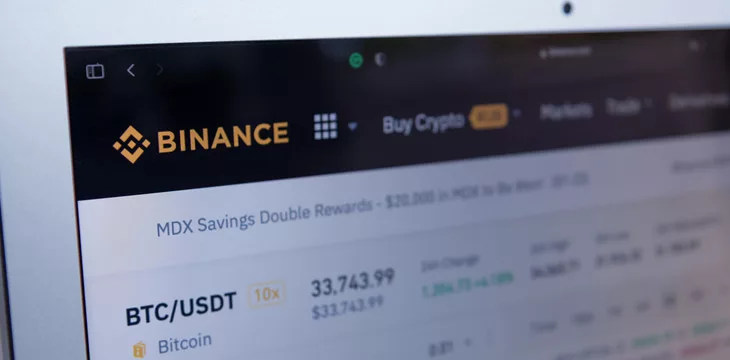|
Getting your Trinity Audio player ready...
|
Binance’s downfall looks all the more imminent following a sealed filing by America’s securities regulator that almost certainly contains damning revelations about the world’s largest digital asset exchange.
On August 28, the U.S. Securities and Exchange Commission (SEC) filed a motion asking the U.S. District Court for the District of Columbia for permission to file a new document under seal. The filing is in support of the civil charges the SEC filed against Binance in June, alleging ‘calculated evasion’ of U.S. securities law.
The SEC’s motion is accompanied by over 30 supporting exhibits, the contents of which can only be guessed at. However, given the extent of the flagrant illegality the SEC was willing to document in previous filings, the nature of these new allegations must be truly alarming.
John Reed Stark, a former SEC enforcement director, noted the exceptional nature of the SEC filing under seal and suggested two possible reasons for the secrecy. First, that revealing this information to the public could compromise “a criminal investigation of prosecution conducted by the U.S. Department of Justice (DOJ).” Second, that disclosing this information could “place a witness or company at risk.”
What’s Up With The Secret U.S. SEC Motion Relating to Binance?
In the U.S. SEC/Binance litigation, the U.S. SEC has filed a sealed motion for leave to file documents under seal, according to an SEC court filing late yesterday. Filing a court document “under seal” allows… pic.twitter.com/cmx6gdh2so
— John Reed Stark (@JohnReedStark) August 29, 2023
But since the latter could be handled via simple redaction of names, Stark’s take is that the information under seal “likely touches upon nonpublic Binance-related money laundering allegations or other potential criminal conduct.” The filing could describe “the heretofore unknown contents of an impending U.S. DOJ Binance-related indictment or an indictment already filed under seal—which the U.S. DOJ would prefer to keep secret.”
Binance has been lawyering up in anticipation of just such a DOJ filing, accompanied by the resignations of multiple senior managers who were reportedly uncomfortable with Binance boss Changpeng ‘CZ’ Zhao’s dismissive attitude to this mounting legal threat.
In addition to the SEC suit and the DOJ’s expected criminal charges, Binance has also been charged by the U.S. Commodity Futures Trading Commission (CFTC). Scuttlebutt has it that the Treasury Department’s Office of Foreign Assets Control (OFAC) is preparing charges based on Binance assisting Russian individuals/entities in skirting the economic sanctions imposed following Russia’s invasion of Ukraine in 2022.
Let’s get ready to ruble!
Speaking of Russia, Binance originally responded to last week’s Wall Street Journal sanctions-dodging report by claiming that it had “no relationship with any banks whatsoever, in Russia or elsewhere, in relation to our P2P program.”
But just days later, Binance’s P2P platform abruptly removed the five Russian banks subject to U.S. sanctions. Binance issued a statement saying: “When gaps are pointed out to us, we seek to address and remediate them as soon as possible … payment methods on the Binance P2P platform that do not fit with our compliance policies are not available on our platform.”
Binance went on to restrict P2P ruble trades to users who underwent ‘know your customer’ screening to prove they were Russian nationals actually residing in Russia. In a further sign that CZ has belatedly begun to realize the mess he’s in, the Wall Street Journal reported this week that Binance was mulling “a full exit” from the Russian market.
Apparently no longer so eager to ‘OFAC around and find out,’ Binance’s P2P platform has also given the boot to Venezuelan government-owned Banco de Venezuela. Binance told Venezuelan customers to “select other payment methods” in order to keep using the platform.
Venezuela has been under U.S. sanctions for nearly two decades for a variety of offenses, including a lack of action on combatting drug trafficking and terrorist financing. In 2018, President Donald Trump issued fresh sanctions to “prohibit transactions involving the Venezuelan government’s issuance of digital currency, coin, or token.”
Has Binance truly turned over a new leaf? Unlikely. This week, two months after Belgium’s Financial Services and Market Authority told the exchange to cease and desist all virtual currency operations within the nation’s borders, Binance announced it would continue to serve Belgian customers through a Polish subsidiary.
Binance told its Belgian users that they’d need to accept the terms and conditions of Binance Poland sp. z.o.o., which is registered in Poland as a virtual assets service provider. Some Belgian users may be asked to resubmit KYC data “to comply with Polish regulatory requirements,” but Binance claims this will allow it to continue serving Belgian customers “in compliance with local regulatory requirements.” Just not the permission of the Belgian regulatory body.
This open defiance of Belgian authority shows that Binance is really only scared of regulators that have both the teeth and the will to sink them into CZ’s fleshy bits. It also suggests that Binance is growing ever more desperate to maintain cash flow as its fiat on-/off-ramps continue to shrink.
Pick a card, any card… no, not those ones
This week saw Binance trumpet the Latin American launch of its Send Cash service. Binance customers in Argentina, Colombia, Costa Rica, Dominican Republic, Guatemala, Honduras, Mexico, Panama, and Paraguay will now be able to transfer digital assets through Binance Pay that will be converted to cash for recipients with bank accounts. At present, only individuals with bank accounts in Argentina and Colombia can actually receive cash via this method.
Meanwhile, Mastercard (NASDAQ: MA) informed Binance last week that it was pulling the plug on its ‘crypto card’ partnerships in Argentina, Brazil, Colombia, and Bahrain effective September 22. Tellingly, Mastercard has yet to announce a halt to partnerships with other digital asset exchanges, including Gemini, and a spokesperson said the trad-fi giant was still looking to sign card deals with other—apparently less toxic—entities.
Visa (NASDAQ: V) reportedly stopped issuing co-branded Binance cards in July while also insisting that it’s not shying away from non-Binance digital asset partnerships. All of which puts a massive dent in Binance’s self-proclaimed “larger mission to increase the adoption and mainstream accessibility of crypto” that the company so loudly hailed a few years ago.
August has proven brutal for Binance on the payments front. U.K.-based credit card processor Checkout.com became the latest to cut ties with Binance, citing “reports of regulators’ actions and orders in relevant jurisdictions.” Binance Connect, a merchant-focused fiat-to-crypto payment gateway, was also shut down as a result of this divorce.
Terror prone
Desperate for some good press to offset its compliance-averse narrative, Binance rushed out a press release last Friday claiming to have “played an active role” in the arrest of “multiple key members” of the Afghanistan-based terror group Islamic State – Khorasan Province (ISKP).
Binance claimed that its teams “were pivotal in identifying, locating, and sharing intelligence that ultimately led to key members of the terrorist group being arrested.” Binance threw a bone at ‘blockchain intelligence’ outfit TRM Labs for having “contributed to much of the intelligence, tracing, analytics, and investigative work.”
However, TRM Labs’ version of events has it being the first to identify a wallet address controlled by ISKP associate Shamil Hukumatov last December and learning that Binance was being used to convert these digital assets into cash. It was only after TRM Labs alerted Binance that the exchange’s crack compliance teams alerted local authorities, ultimately leading to Hukumatov’s arrest in June.
So Binance either wasn’t aware that they were facilitating the funding of terrorism, or they didn’t care. Recall that the CFTC v. Binance suit contained internal chats in which Binance’s former compliance chief jokes about individual “HAMAS transactions” on the exchange being so small they couldn’t even pay for a single AK-47, and that this was necessary because “large sums constitute money laundering.”
In an interview with Fortune, Binance’s VP of Global Intelligence and Investigations Tigran Gambaryan declined to provide specifics on which tokens were involved in the ISKP episode, except to say that it wasn’t so-called ‘privacy coin’ Monero.
TRM wasn’t so skittish in revealing that the wallet in question had received US$2 million in the USDT (Tether) stablecoin on the Tron blockchain. Since Binance and Tether are the primary pillars that keep the Crypto Crime Cartel’s roof from collapsing in on itself, it’s understandable that they’d be less inclined to bolster their shared reputation for facilitating terrorist financing.
(g)ETF(**ked)
Finally, the fiat price of many high-profile tokens spiked Tuesday after a U.S. federal court ordered the SEC to reconsider the bid by Digital Currency Group subsidiary Grayscale Investments to convert its BTC-based trust (GBTC) into a spot-based exchange-traded fund (ETF).
Hopes are high that the SEC will finally approve a spot-based BTC ETF, given that it previously approved some BTC-futures exchange-traded products (ETP). The ‘number go up’ crowd maintains that an SEC-approved BTC spot ETF will prompt a flood of public money to flow into the space, adding some sorely needed liquidity that hasn’t been seen since the onset of ‘crypto winter’ in early 2022.
Previous spot-based ETFs were rejected because the SEC believes the market is too prone to manipulation. Ever since the first real BTC price bubble in 2017, Tether-based wash trading on dodgy exchanges has been credited with ensuring the price stays artificially high until the right people have cashed out, using late-coming retail customers as exit liquidity.
Not much has changed since then, even as Binance adds other sketchy stablecoins with fiscal reserves as questionable as Tether’s. So, the SEC still has valid reasons for rejecting a spot-based ETF. That is, unless both Binance and Tether were to magically disappear.
Which brings us back to that sealed SEC motion. Binance is where the overwhelming majority of BTC-USDT spot trades occur. This interconnectedness provides a golden opportunity for the DoJ to kill two (jail)birds with one stone.
Some eternally optimistic crypto bros might view this tandem takeout as eliminating the SEC’s price-fixing objections. But who then would become the vehicle for BTC price discovery?
What about Coinbase (NASDAQ: COIN)? The exchange that paid a $100 million penalty this year for shoddy anti-money laundering protocols? Who were sued for listing unregistered securities and has a venture capital arm that sometimes invests in those unregistered securities? Who launched an Ethereum layer 2 for which it acts as the sole validator of on-chain transactions and which has already proven fertile ground for scammers?
Or perhaps Kraken, the exchange that paid a $30 million fine for selling unregistered securities via its staking programs and got similarly spanked for violating U.S. economic sanctions against Iran?
Then again, perhaps the real ‘price discovery’ will occur when the likes of Binance, Tether, and other crooks lose the capacity to artificially inflate token prices. Far from encouraging retail adoption, the resulting crash will permanently scare off any would-be customers that might have been sitting on the sidelines. Careful what you wish for, moon-boys.
Follow CoinGeek’s Crypto Crime Cartel series, which delves into the stream of group—from BitMEX to Binance, Bitcoin.com, Blockstream, ShapeShift, Coinbase, Ripple,
Ethereum, FTX and Tether—who have co-opted the digital asset revolution and turned the industry into a minefield for naïve (and even experienced) players in the market.

 05-07-2025
05-07-2025 





